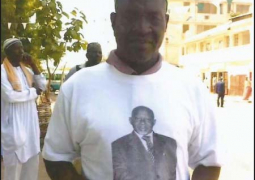Stakeholders from various relevant sectors including civil society and Government departments on 20 August 2013 validated the draft country programming framework of the Government of The Gambia and Food and Agriculture Organization (FAO) of 2013-2016.
In her welcoming remarks, the permanent secretary at the Ministry of Agriculture, Ada Gaye, said the presence of many of the key stakeholders and partners of the agriculture and natural resources sector was a testimony of the importance attached to the sector.
She noted that the programme framework is the blueprint for the development cooperation between the Government of The Gambia and the FAO.
The permanent secretary also stated that the objective of the workshop was to engender discussion on the draft Country Programme Framework (CPF) for timely and valuable inputs before its finalization and signature by the FAO and the relevant government partners.
For his part, the FAO country representative, Dr Babagana Ahmadu, said the CPF is a tool for the FAO country-level strategic prioritization and overall medium-term country level programming with the vision and mission to strengthen the effectiveness, impact, and visibility of FAO assistance to member countries through a strategic and coherent country programme, developed in close consultation with the government and other national stakeholders.
He noted that the CPF is a key component of the FAO country programming process, which includes national priority setting when requested by the government and delineates national development objectives on agriculture, food security and rural development.
He further stated that the document is co-owned by the Government of The Gambia and FAO and indicates the broad commitment of the FAO, subject to the availability of required funding, to assist the Government of The Gambia in its effort to achieve national development objectives.
For her part, the minister of Environment, Parks and Wildlife, Hon. Fatou Ndey Gaye, said the draft document applied demonstrates the FAO’s commitment to partnering with the Gambia government in providing technical assistance and advice in the formulation and implementation of policies, strategies, programmes and projects in food, agriculture and natural resources.
She outlined her ministry’s commitment in strengthening partnership with FAO in sustainable natural resources management and development, and support to disaster risk reduction, emergency and climate change adaptation.
The FAO’s intervention in these areas lends support to the environmental pillar of sustainable development, which has been internationally recognised as an important pillar of sustainable development, she said.
She also challenged the participants to carefully scrutinize the draft document and make constructive comments to ensure the final CPF address the national development aspirations.
In his official statement, the minister of Fisheries and Water Resources, Hon. Mass Axi Gai, said the CPF had identified key priorities for FAO-government collaboration in socio-economic development in agriculture and natural resources.
He said the sustainable aquaculture system project in The Gambia (TCP) implemented in the Central River Region was another major intervention of the FAO in the fisheries sector, especially inland fisheries.
Representing the minister of Finance and Economic Affairs, deputy permanent secretary Mod K. Ceesay said the CPF 2013-2016 will support The Gambia’s development programme -PAGE - that seeks to raise the standard of living of Gambians by transforming the country into a middle-income country by 2020.
He also stated that the country programming framework stakeholders’ validation would lead to an increased growth in employment generation for socioeconomic development and enhance productivity and food security.
The CPF will be useful in guiding FAO programming and resource mobilization efforts in The Gambia, he noted.
Read Other Articles In Article (Archive)
Local Government elections
Feb 14, 2013, 11:20 AM



